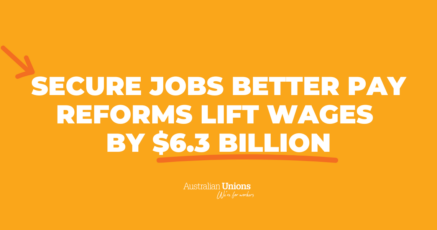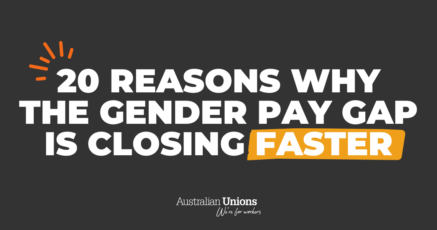Update – 2 May 2023
Good news! On 2 May 2023, the Federal Government announced that superannuation is to be paid on the same day as wages.
This will not only make it easier to detect and recover unpaid super, it will also help prevent its non-payment – quarterly payments will no longer obscure what workers are owed.
Hello and congratulations! You have finally reached retirement. Your decades of work are about to pay off. But just before you go any further, we need you to tick off some paperwork.
Oh. Oh dear. We’re so sorry. If you’re a nurse, aged care worker, midwife, early childhood educator or hospitality worker, then we need to subtract about $40,000 from your retirement savings.
That’s just how it is. It’s not like anyone relies on those feminised industries anyway, right?
Women workers face setback after setback
Industry Super has released a report estimating that stolen superannuation could be reduced by 15 per cent if employers were required to simply pay it on pay day rather than on a quarterly basis.
And if you thought the gender pay gap was bad, the gendered difference for superannuation is equally eye-watering.
With the way super payments work now, about one million women in Australia have had more than $1.3 billion in super contributions stolen in a year.
And for workers in female dominated industries like nursing, aged care, administration, and education? Yep, you guessed it. They miss out on more than $40,0000 in super savings.
When you get paid super makes a difference
Here’s how it normally works: your wages are paid on a regular basis (often weekly, fortnightly or monthly) and you get a payslip the day you are paid.
On your payslip it shows you the hours you have worked and the amount you have been paid for those hours. It’s simple for you to check that the hours and the pay are correct.
But superannuation payments don’t happen the same way. They don’t even happen on a strictly quarterly basis – it’s more like a few weeks after the end of each quarter.
Automatically, that makes it a lot harder for you to keep track of whether you have been paid the correct amount in super. It becomes even more difficult if you work casually with varying hours or if you work multiple jobs.
All these factors mean it’s a lot easier for dodgy employers to steal your super than it is to steal wages (although that happens too!). If super was paid on pay day, it would be a lot easier for you to spot missing super and you’d be able to act on it, with your union, a lot sooner.
One step to achieving fair super for all workers
Having your super paid on pay day would be just one step towards achieving fair super and eradicating entrenched inequalities.
The super system is no longer working as originally intended: to ensure when you leave paid work, you can retire with a decent standard of living.
Last week the Government introduced legislation to finally enshrine superannuation as a fundamental workplace right in the National Employment Standards. If you’re an employee, then the National Employment Standards apply to you.
As it currently stands, not all workers are entitled to recover their superannuation with their union or by themselves. Instead, they have to rely on the Tax Office which has a patchy record in helping workers get their super back.
Soon, all workers will have the unambiguous right to recover their unpaid super with their union. In the meantime, your union is still the first place to contact if any of this information has set off alarm bells. Your union will know the best steps to recovering any stolen super or wages, whether it’s working with your employer, going through the Fair Work Commission, through the Tax Office or through the courts.
The way super works can incredibly confusing, but being a union member means you get access to advice about your superannuation rights. When you’re in a union, you have support if or when you need it.






SHARE:
Are you losing out on superannuation because of quarterly payments?